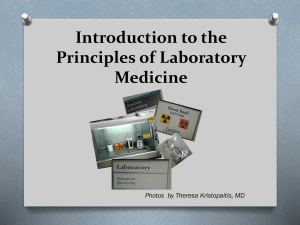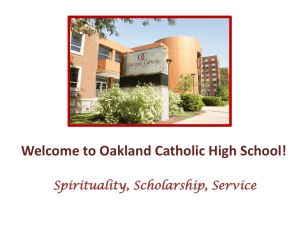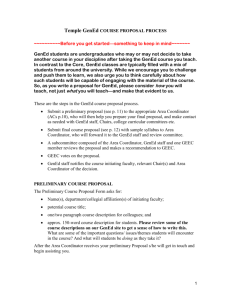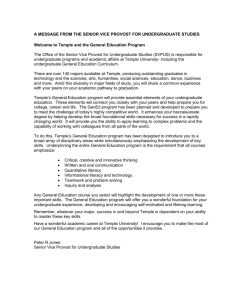Professional Development Program: “Physics First”
advertisement
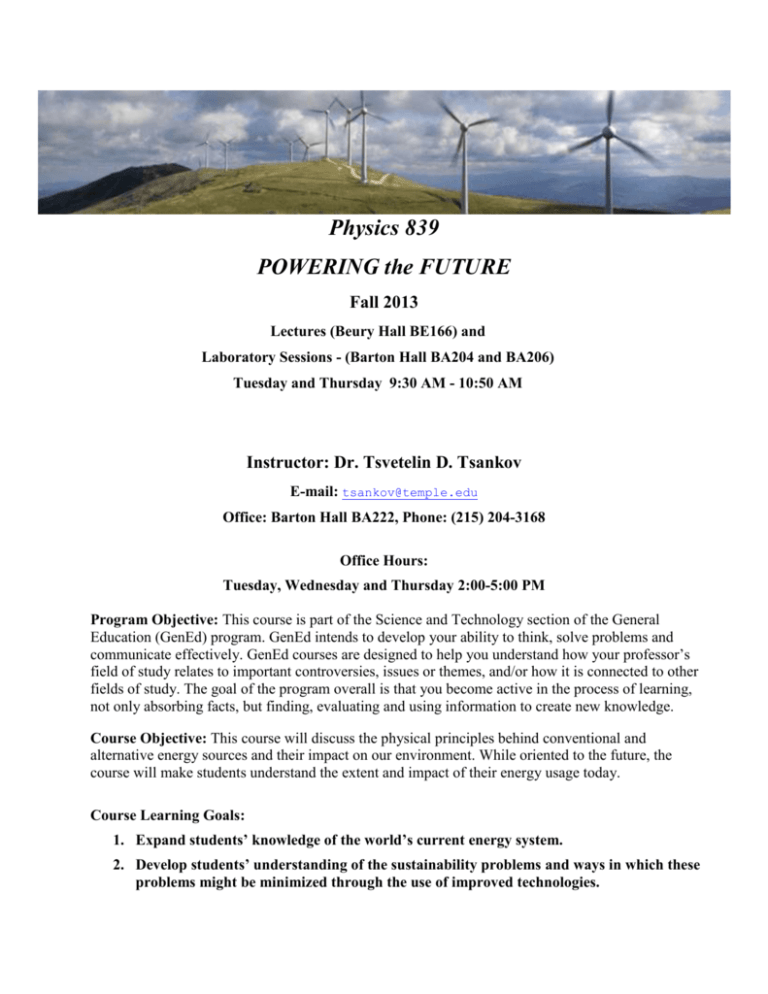
Physics 839 POWERING the FUTURE Fall 2013 Lectures (Beury Hall BE166) and Laboratory Sessions - (Barton Hall BA204 and BA206) Tuesday and Thursday 9:30 AM - 10:50 AM Instructor: Dr. Tsvetelin D. Tsankov E-mail: tsankov@temple.edu Office: Barton Hall BA222, Phone: (215) 204-3168 Office Hours: Tuesday, Wednesday and Thursday 2:00-5:00 PM Program Objective: This course is part of the Science and Technology section of the General Education (GenEd) program. GenEd intends to develop your ability to think, solve problems and communicate effectively. GenEd courses are designed to help you understand how your professor’s field of study relates to important controversies, issues or themes, and/or how it is connected to other fields of study. The goal of the program overall is that you become active in the process of learning, not only absorbing facts, but finding, evaluating and using information to create new knowledge. Course Objective: This course will discuss the physical principles behind conventional and alternative energy sources and their impact on our environment. While oriented to the future, the course will make students understand the extent and impact of their energy usage today. Course Learning Goals: 1. Expand students’ knowledge of the world’s current energy system. 2. Develop students’ understanding of the sustainability problems and ways in which these problems might be minimized through the use of improved technologies. 3. Develop students’ ability to make informed judgments about energy systems such as solar thermal, solar photovoltaic, nuclear, biofuel, hydro, and wind systems. 4. Develop collaborative learning and teamwork skills. 5. Develop students’ information literacy skills. 6. Develop student’s thinking and communication skills. Materials: Textbook: Roger A. Hinrichs, Merlin Kleinbach, Energy, Its Use and the Environment, Cengage Learning, Fifth Edition, ISBN: 9781111990831 Scientific calculator Learning components: The basic learning strategy in Physics 839 can be summarized as follows: 1. Experience it (Lab). 2. Read about it (Textbook) and untangle it (Lecture). 3. Apply it (Diagnostic Tests and Homework Assignments). 4. Research it (Sustainability project). 5. Synthesize it (Final exam). The course includes several lab investigations designed to give students the opportunity to explore practically energy concepts after reading about them and discussing them in lectures. After every course unit students will be required to work in class through a brief multiple-choice Diagnostic Test. The tests consist of 10 questions. Each test is open-book. Students can use their lecture notes, the textbook and printed copies of the PowerPoint slide presentations shown in class. Discussion Groups. The class will be divided into discussion groups of up to 5 students each. These teams will engage in group activities (laboratory sessions and research) during the semester. Research Project in Sustainability. Students will form discussion groups. Each group will research one topic among the following topics related to Sustainability: Solar Thermal Systems (passive). Permaculture (sustainable agriculture). Alternative home-building (earth-sheltered, straw bale, stone, mud brick etc.). Small-wind systems (up to 20 kW). Biogas (small-scale production and applications). Radical car designs (cutting edge research). Lawns vs. Fruit and Vegetable Gardens (a comparative study in suburban sustainability). The outcome of the investigation of each group should be presented in the form of a research report (about 10-12 pages long, including diagrams and/or images). The report should contain a little bit of background history, main exposition which highlights the fundamental principles concerning the particular topic, examples of actual implementations and some quantitative information. Each group must elect a representative who will communicate directly with the instructor regarding the project. The grade of the research report will be determined partially (60%) by the quality of the work and partially (40%) by the individual contribution of each student. The individual contribution will be evaluated through filling out feedback forms where each team member will rate his/her own contribution and the contribution of their peers. The groups will be given the opportunity to present their work via slide presentation at the end of the semester and earn extra credit in the amount of up to 10% of the course grade. The extra credit is awarded via anonymous voting by all students. Homework: Homework assignments require simple quantitative analysis of technical problems related to energy technologies. Examinations: The final exam is on Thursday, December 12, 8:00-10:00. The final exam is closed book and multiple-choice. The exam will consist of 60 questions, half of which are taken from the diagnostic tests taken during the semester, 2 questions for each Research Project topic and the rest will be new questions based on the course material. Laboratories: During lab investigations, you are supposed to keep a careful record of all activities, measured data, calculations, tables, graphs and conclusions in a notebook, used specifically for that purpose. Your lab grade will be determined based on (a) attendance (20%) and (b) the content of your lab notebook (80%). Grading: The grade contribution of the different assessment tools is as follows: Final exam Laboratory Diagnostic Tests Collaborative Research Project Quantitative Homework TOTAL 30% 20% 20% 20% 10% 100% A AB+ B BC+ C CD F 100%...92% 91%...86% 85%...80% 79%...75% 74%...70% 69%...67% 66%...60% 59%...55% 54%...46% 45%...0% Last day to drop the course (tuition refund available): Monday, September 9. Withdrawal from classes: Last day to withdraw: Tuesday, October 22. Course Schedule - Physics 839 Week #1 (August 26 - August 30) Course Introduction Course Overview. Math Review. Measurement Units. Energy and Power. [Chapter 2] Week #2 (September 3 – September 6) Energy Patterns and Trends Energy Supply and Consumption. [Chapter 1 and 7] Energy and Mineral Resources and Sustainability. [Chapter 7, 8 and 9] Week #3 (September 9 – September 13) Energy Fundamentals Basics of Energy Science. [Chapter 3 and 4] Introduction to Electricity. [Chapter 10] Week #4 (September 16 - September 20) Electric Power Systems Steam-based electric power plants. [Chapter 11] Nuclear Power. [Chapter 13 and 14] Week #5 (September 23 - September 27) LABS Week #6 (September 30 - October 4) LABS Week #7 (October 7 – October 11) Sustainable Electricity-Part 1 Hydro-electric Power Plants. [Chapter 12] Geothermal Plants. [Chapter 18] Wind Energy and Solar Energy. [Chapter 6 and 12] Week #8 (October 14 – October 18) Sustainable Electricity-Part 2 Fuel Cells and Stirling Engines. [Chapter 4 and 10] Week #9(October 21 - October 25) LABS Week #10 (October 28– November 1) LABS Week #11 (November 4 – November 8) Sustainable Electricity-Part 3 Photovoltaic Systems. (Lab notebooks due on Thursday November 7) Week #12 (November 11 - November 15) Sustainable Transportation Transportation Energy and Efficient Vehicles. Emerging Vehicle Technologies. (Research Reports due on Thursday November 14 ) Week #13 (November 18 – November 22) Alternative Transportation Fuels. [Chapter 17] Energy Efficiency for Buildings. [Chapter 5 and 10] Week #14 (November 25 - November 29) Sustainable Housing Research Report presentations. THANKSGIVING BREAK Week #15 (December 2 - December 4) Research Report presentations. Final Exam: Thursday, December 12, 8:00-10:00 in Beury Hall BE166. 4




